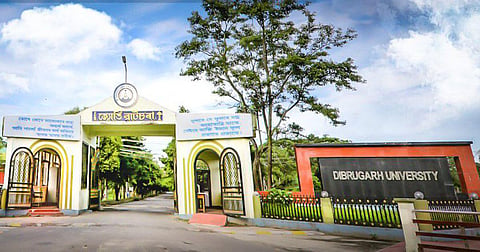
- Home
- Live Blog
- Breaking News
- Top Headlines
- Cities
- NE News
- Sentinel Media
- Sports
- Education
- Jobs

A CORRESPONDENT
DIBRUGARH: The Department of Applied Geology at Dibrugarh University organized a thought-provoking invited talk on Wednesday, spotlighting a pressing issue confronting India’s water resources: emerging antimicrobial resistance in groundwater.
The event took place at 2:30 PM in the Prof SK Dutta Memorial Conference Hall and featured distinguished researcher Dr George J Wilson, Post-Doctoral Research Associate at the University of Manchester, UK.
The session drew a diverse audience, including Prof Subrata Borgohain Gogoi, Dean of the Faculty of Earth Sciences & Energy Prof Manas Sarma, Professor of Practice at the Faculty of Earth Sciences & Energy, Prof Tapos Kr. Goswami, Head of the Department of Applied Geology, senior faculties, research scholars, and students.
The proceedings were hosted by David Anand Aind, Assistant Professor of Applied Geology, while Dr Pranjit Kalita, Assistant Professor at the department, delivered the vote of thanks.
In his address, Dr Wilson shed light on the escalating challenge of antimicrobial drug usage and its persistence in natural environments, specifically India’s groundwater reserves. He explained that antimicrobial resistance (AMR) occurs when microorganisms—bacteria, viruses, fungi, and parasites—develop the ability to withstand drugs designed to kill them. AMR is a global health and environmental concern, threatening effective treatment of infectious disease and undermining advances in medicine.
Dr Wilson emphasized the one health concept, which recognizes the interconnectedness of people, animals, and environments in the emergence and spread of AMR. He noted that India, with its vast population and heavy reliance on groundwater, faces acute risks due to pharmaceutical residues—from hospital, agricultural, and domestic sources—finding their way into aquifers.
Illustrating the issue with local relevance, Dr Wilson shared findings from a recent study conducted in Patna, Bihar. Using advanced DNA analysis techniques, his research traced the occurrence and persistence of sulphanomides—a class of antibiotic drugs—in groundwater samples. The results pointed to the alarming ability of these compounds to remain in aquifers long after initial introduction, encouraging bacteria to evolve resistance genes that can be transferred to other pathogens. These findings highlighted the urgent need for surveillance and mitigation strategies to safeguard water quality and public health.
Dr Wilson urged for heightened interdisciplinary collaboration between scientists, policymakers, and community leaders to tackle this issue. He advocated for rigorous monitoring of groundwater quality, improved waste management, particularly of medical and pharmaceutical effluents, targeted research on resistant gene dissemination pathways, and public education on the prudent use of antibiotics.
The event concluded with an engaging Q&A session, where attendees discussed challenges and innovative approaches to curbing AMR in groundwater, underscoring the importance of continued research and awareness in this field.
Also Read: Assam: CM to inaugurate new campus of Rabindranath Thakur Vishwavidyalaya
Also Watch: